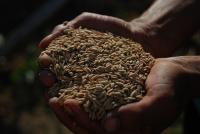Small farmers face pretty much the same issues no matter what part of the world they happen to till -- access to land, seed, financing and more.
I learned that lesson while rolling through the hills of northern Nicaragua, acting as an interpreter for a brigade of Canadian farmers hoping to transfer their skills to support local farmers. At that time mechanization for many small farmers in Nicaragua seemed to be the main impediment. But thinking back to the exchanges I translated, the lack of tractors, chemicals and artificial fertilizers presented challenges but also possibilities to explore.










Comments
Do
Don't